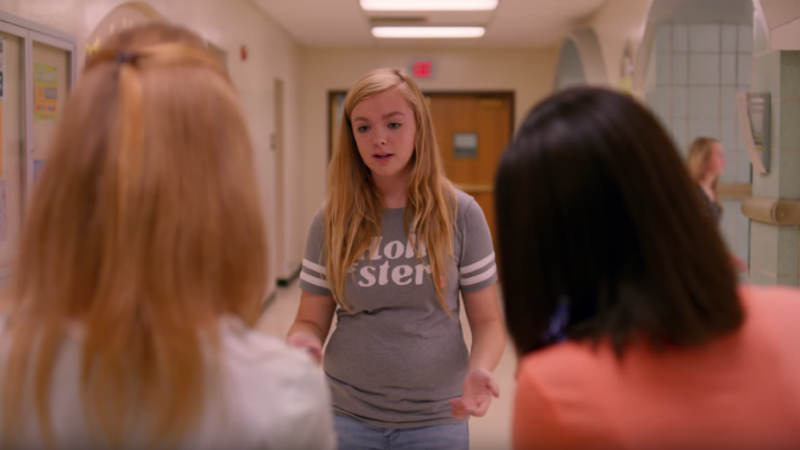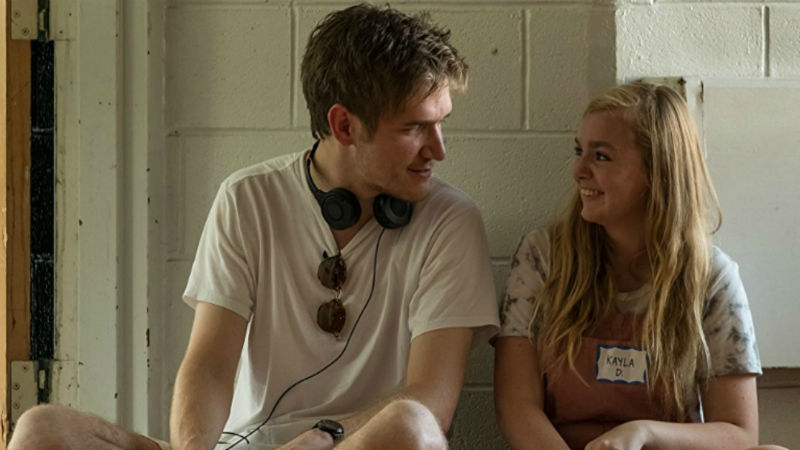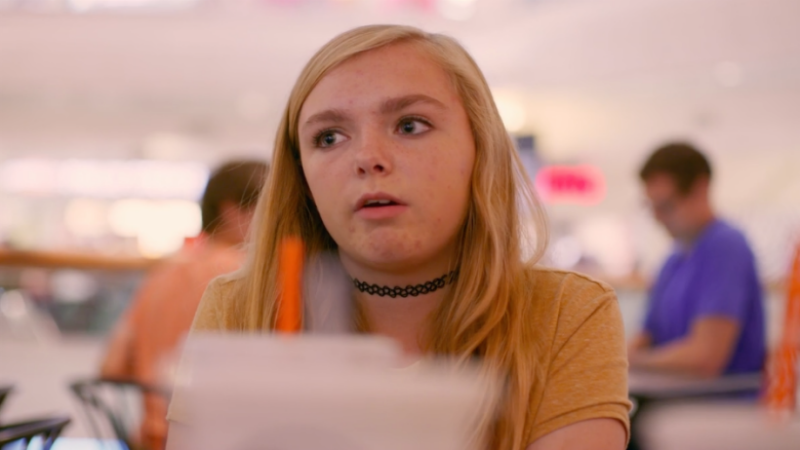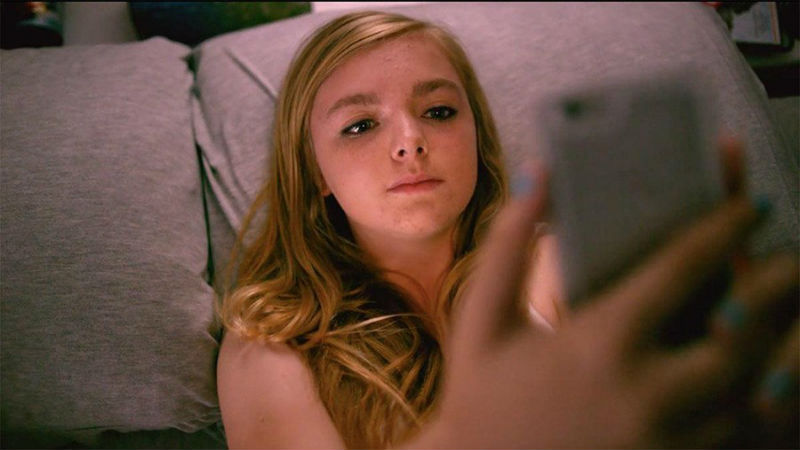




WARNING: THIS ARTICLE MAY CONTAIN SPOILERS
Anxiety. This is a word with connotations of trepidation, yet it is one that we are well acquainted with. It is something many of us are plagued with, but few of us know how to properly describe. At its worst, anxiety is harrowingly constant, emotionally draining, and seemingly inescapable.
His own feelings of angst compelled YouTuber and stand-up comedian Bo Burnham to write and to direct his debut feature, Eighth Grade. Premiering in the United States in the summer of 2018, but only now hitting UK screens, it tells the story of 13-year-old YouTube vlogger, Kayla Day (Elsie Fisher). Her YouTube vlogs are presented as monologues in which she provides insights into life for her viewers. Her range of topics include putting yourself out there, how confidence is a choice, and the inevitabilities of growing up.
We soon learn however that she does not practice what she preaches. In fact, despite coming off as bubbly and free-spirited in her videos, Kayla is, in reality, painfully shy. She is quiet, can barely hold a conversation with other people, and wallows in the escapism of the internet, both for comfort and intensified anguish. During the last week of eighth grade, her final year in middle school, Kayla decides it is finally time to put herself out there. Thus, the audience is made to watch as Kayla desperately tries to become more open and outgoing.
Eighth Grade is a tremendous film. In my top picks of the decade. I have seen it three times, and I find myself falling deeper in love after each viewing. It is capable of both heart-warming sentimentality and excruciating cringe, often simultaneously. Yet it is the compassionate sympathy it has towards being youthful and nervous that makes it the gem it truly is. Although it can be horrifyingly accurate in its presentation of unbearable anxiety, it is in truth an optimistic piece. It showcases the worst of what anxiety can do to us, but, by simply showing empathy and offering reassurance in its narrative and cinematic techniques, it also demonstrates comforting understanding.

.
The internet gets emotional
There are a variety of ways in which the film does this, such as with its utilisation of social media. I spoke to Bo Burnham (pictured below, alongside with Elsie Fisher) on the red carpet for a brief interview during the Glasgow Film Festival. He explained to me that he wanted to “do justice to the experience he had on the internet”. Small montages of Kayla surfing the net, whether it be Instagram, Buzzfeed questionnaires, or blink-and-you-miss-it pop culture references in her internet tabs showcase the vastness of material, and or fodder, the internet can offer the young mind in the form of escapism.
Burnham goes even further. Because the initial idea came from his own feelings of anxiety, he had to find the right character template to encompass both his “emotional relationship” with the internet and the very nerves he and millions of other young people feel. Although Kayla was originally not supposed to be the lone main character, she became the sole focus for she seemed to be the perfect embodiment of what Burnham was setting out to do. He based Kayla on the young girls he was seeing making YouTube vlogs, he clarified to me.
These young girls, like Kayla, are part of a generation of self-publication; of young people using the internet as a means to project and express their thoughts and feelings, as if the internet itself is an entity in which the youth can confide in. Burnham specifically chose to focus on girls as, from his own research, boys tended to talk more about arbitrary topics, namely video games, while girls tended to use YouTube and social media as a platform to either express their emotions, or create the illusion of an adventurous lifestyle. Thus Kayla became the ideal means of bridging Burnham’s two inspirations.
The incorporation of the internet in such a delicate, naturalistic way acts as a catalyst for portraying the depth that Kayla and the film, possess. If the movie was but a mere collage of montages, the audience would still be able to build a concrete idea of what kind of person Kayla is purely from what social media she uses, and how she uses it. One could potentially view these montages, accompanied by an effervescent score from Anna Meredith, as Burnham’s own love letter to the internet as a whole.

.
Lonely and fearful
Yet Burnham does not shy away from the internet’s more damaging aspects. Despite how connected the entire world can feel through the internet, it can also be a source of despair and isolation. As much as the internet can be a means for one to show off their life and how “cool” it is, it can potentially fan the flames of loneliness for those who crave more in their lives. Kayla fits this description suitably, scrolling through Tweets, Instagram videos, and Snapchat stories of her classmates, longing for friendship, romance, and basic connection. As such, late night internet surfacing and trying to snap the perfect selfie can be just as detrimental to anxiety as it is a way of escape from anxiety.
The YouTube heavy focus allows for deeper exploration of this. Kayla creates her videos under the guise of giving life advice, but they garner little to no views. Making this worse is that they serve more as a projection for her own wants in life. There is a particularly effective moment where she makes a vlog concerning trying new things, reciting a fabricated story about how she invited a shy girl to a party only to discover how interesting she was. But her dialogue plays over a scene of Kayla arriving at the luxurious house of her school’s queen bee, having been reluctantly invited to a pool party.
As Kayla speaks to her theoretical viewers about how good it is to be open to new people and ideas, the camera follows Kayla up the pathway, through the house, and into the bathroom, where she proceeds to have what I read as a small panic attack. This showcases Kayla’s inability to act on her own words, something she vows to change throughout the film. She is detailing and desiring a romanticised version of events on how she would like the pool party to go. But, just like with her minimal YouTube views, reality has other plans.
However, the pool party is only one example of the mesmerising craft that Eighth Grade displays. When I first saw the film, I was struck by Burnham’s fluency in film language, and he uses it to demonstrate how titanic Kayla’s teen angst is. The very first scene showcases Kayla filming a new vlog. Initially we are in a close up, with Kayla’s feigned confidence dominating the screen. Yet the more she speaks, with her muddled words and repeated sayings, the camera slowly pulls back, creating more and more distance between Kayla and the viewer.

.
Far away so close
Distance is key to understanding the accuracy of which Eighth Grade depicts anxiety. The constant usage of the internet by Kayla is her way of talking to people, or spying upon the lives of others, should it be her classmates or celebrity superstars, at a comfortable distance. The pool party scene tends to film Kayla from behind, as if she wants to go unnoticed. In school, she is often seen towards the back or side of the classroom, as if keeping apart from her classmates. Even when interacting with her own father, distance is applied. An empty chair is left between the pair at the kitchen table, and during a scene where the two talk in Kayla’s bedroom, the camera is deliberately placed at the corner of the room, depicting Kayla in her bed at one end of the frame, and her father by the bedroom door at the other end.
Burnham allows us to visualise Kayla’s inner strife. Burnham’s direction allows the audience to see the barriers separating the teen from others. The bedroom scene uses physical distance between Kayla her father and as a proxy for mental disconnection. The way Kayla awkwardly engages or refuses to engage with others, such as trying to hide toward the back of a group photo at the pool party, or lying to her crush to win his attention, also adds to this sense of distance. The cinematography, editing, and even sound mixing recreate the feelings of panic and claustrophobia that come with anxiety; with being disconnected in a world more connected than ever. The screenplay’s authentic portrayal of teenage behaviour and dialogue further adds to the realism of this.
Add it all up and you get what sounds like a bleak experience. Some reviewers have noted how close the picture comes to a horror film, and how it captures the scary feelings of being shy and reserved. Elsie Fisher’s spellbinding performance helps a lot. Her subdued replication of teenage angst embodies the long lasting woes of the contemporary digital age.

.
A glimmer of hope
Eighth Grade‘s underlying sympathy towards its protagonist – beneath all the sheer horror of her predicament – makes it one of the best films of the decade. It does not simply recreate teenage mannerisms and feelings because it can, or because it wants you to have warlike flashbacks to your own repressed teenage memories. It does not condescend to its audience, the way many teen based films do. Instead, it uses its all too familiar emotions in order to offer viewers guidance, empathy, and, most importantly, a robust sense of reassurance.
We have to sit through and watch as Kayla attempts to connect with others in vain. There are some glimpses of light in the form of a high school field day, or when she garners the strength to sing a karaoke song at the pool party. But it is otherwise a consistently unsettling piece where we long for Kayla to catch the break she hungers for yet fails to achieve, including an especially uncomfortable moment in a car.
Towards the end of the film, a key conversation between Kayla and her father over a fire in the backyard puts everything into perspective as he consoles his daughter, and by extension the audience, on how much she already has, and how much she still has to offer. What he is essentially telling her, and us, is that it does not matter how bad your teenage years, or even your current life, may seem, for in the end it will all be okay. Or, as Kayla says, “just because things are happening now doesn’t mean they’re always gonna happen”. This is where the scale of the film’s emotional solidarity with its audience becomes clear. We find ourselves asking, if Kayla can overcome her anxiety, then we too have the power to overcome ours.
Eighth Grade’s melancholic optimism thrives because it understands the mind of the contemporary teen. Burnham’s extensive internet background made him the perfect visionary to bring this story to the world. Eighth Grade is a miraculous debut feature – the script, Elsie Fisher’s stellar performance, the director’s firm grip. It is my hope that Eighth Grade will speak to all anxious and lonely people, young and old, and will continue to do so for generations to come.




















